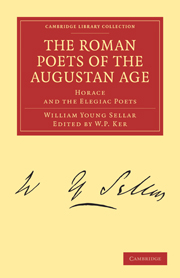Book contents
- Frontmatter
- EDITOR'S PREFACE
- Contents
- Dedication
- WILLIAM YOUNG SELLAR
- HORACE
- CHAPTER I LIFE AND PERSONAL CHARACTERISTICS OF HORACE
- CHAPTER II THE SATIRES
- CHAPTER III HORACE AS A MORALIST
- CHAPTER IV HORACE AS A LITERARY CRITIC
- CHAPTER V HORACE AS A LYRICAL POET—THE EPODES
- CHAPTER VI HORACE AS A LYRICAL POET—THE ODES
- THE ELEGIAC POETS
CHAPTER III - HORACE AS A MORALIST
Published online by Cambridge University Press: 07 September 2011
- Frontmatter
- EDITOR'S PREFACE
- Contents
- Dedication
- WILLIAM YOUNG SELLAR
- HORACE
- CHAPTER I LIFE AND PERSONAL CHARACTERISTICS OF HORACE
- CHAPTER II THE SATIRES
- CHAPTER III HORACE AS A MORALIST
- CHAPTER IV HORACE AS A LITERARY CRITIC
- CHAPTER V HORACE AS A LYRICAL POET—THE EPODES
- CHAPTER VI HORACE AS A LYRICAL POET—THE ODES
- THE ELEGIAC POETS
Summary
Epistles. Book I
The Epistles belong essentially to the same branch of literature as the Satires. To both Horace applies the term ‘sermones’ to distinguish them from the Odes, which he calls ‘carmina.’ They are both written in hexameter verse, in a style more akin to the urbanity and conversational ease of Terence, than to the tones of elevated poetry or high-pitched rhetoric. They make little demand on that pure but not very abundant spring of feeling and imagination, which seems to have flowed only scantily and intermittently during the years when the Satires were composed, and which Horace himself felt was becoming less active at the time when he wrote the dedicatory introduction to the first book of the Epistles. But the epistolary form gave a freer outlet than any other form adopted by him, to that observation of the ways and course of life, that constant reflexion on himself, that sympathy with and power of probing the inner life of others, that informal didactic tendency, which mingle with the social and personal criticism of the Satires, and are an important element in his lyrical poetry, but which formed the main current of his intellectual being at the time when the first book of the Epistles was composed.
While the Epistles are a new and more original product of the intellectual faculties which produced the Satires, they belong to a different stage in his intellectual development, and indicate a considerable change in his social relations, his literary position, his habits of life, his spirit and temper.
- Type
- Chapter
- Information
- The Roman Poets of the Augustan AgeHorace and the Elegiac Poets, pp. 85 - 101Publisher: Cambridge University PressPrint publication year: 2010First published in: 1892



